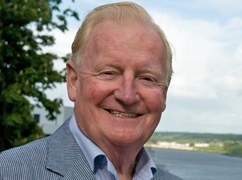Brendan Duddy
Brendan Duddy was born in Derry on 10 June 1936. He became a businessman in his native city, and by the early 1970s he owned and managed two fish-and-chip shops, one in Beechwood Avenue (Creggan) and another in William Street.
His motivation for involvement in community affairs, and eventually in behind-the-scene politics, grew out of a deep interest in politics and debate ("I have been a political analyst all my life"), and out of an upbringing in a mixed community where Protestants marginally outnumbered Catholics, a fact he highlighted when making his statement for the Bloody Sunday Inquiry in 1999.
"Much of my early life was associated with the Protestant population, many of my friends and associates were, and still are, Protestants and I realised that there were two communities and that the only way forward was to bridge the divide between them. I have been pacifist, anti-war, and anti-violence all my life".
Duddy has been firmly committed to the peace process, believing that only dialogue would lead to a settlement. Knowing many active members of the civil rights movement, as well as Nationalist party politicians, he was however not directly involved with NICRA, and did not as a rule attend marches. By the mid-1960s, one of the two premises he owned (in Beechwood Avenue), attracted a broad cross-section of people interested in political debate who would gather there informally, until the setting-up of a barricade in about early 1971 made it difficult for some of those on the other side to come to the Creggan. While the meetings were open to anybody, there was no conscious dialogue going on with the Republicans (or Provisionals). Duddy knew Martin McGuinness in the 1960s when he worked for a supplier company delivering burgers to Duddy's shops - at a time when McGuinness's interest in politics was not yet kindled. Members of the police force also frequented the shop, and Duddy was friendly with Peter Gilgunn, one of two officers killed shortly before Bloody Sunday.
Brendan Duddy died 2017 after a period of illness.

